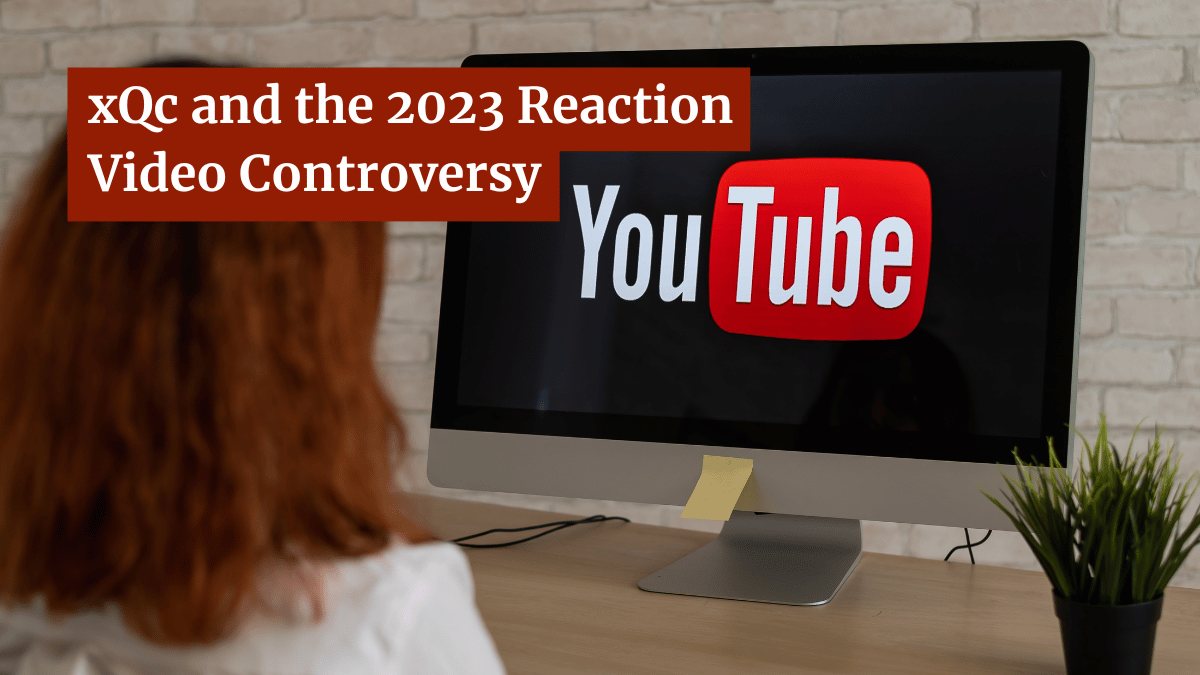xQc and the 2023 Reaction Video Controversy

On July 24, popular streamer and YouTuber xQc uploaded a video to his channel entitled The Kennedy Assassination | xQc Reacts to LeMMiNO. The video was a “reaction video” that supposedly featured xQc reacting to the content of the original video.
What it contained was the entirety of the original video, entitled The Kennedy Assassination, with is a one hour, 38 minute work. To make matters worse, xQc had minimal to say or add to the video, leading many to express frustration at his use of the content.
xQc then doubled down by leaving a video by Neo Explains up on a stream while he left the room for ten minutes, providing no comment or input.
This prompted another prominent YouTuber, Ethan Klein, to tag xQc in a post on X (Twitter), accusing him of being a “content thief.” That then led to an on-air debate between Klein and xQc on Klein’s H3 Podcast, where xQc attempted to defend his actions pointed out that H3 participates in reaction videos as well.
However, Klein was quick to point out that his channel rarely plays a video in its entirety and gives much more commentary. Klein went on to point out that xQc is a multimillionaire and is taking content from smaller creators, not caring about their rights or respecting the decisions they make over their property.
After the debate ended, Klein then leaked direct messages sent by xQc, which concluded with xQc bragging about his wealth and having his “whole house on my wrist” with a picture of his watch.
However, xQc is not the only one facing allegations of content theft. Prominent YouTuber and streamer SSSniperwolf is facing allegations “freebooting” in her reaction videos of TikTok compilations.
On Reddit, the broader controversy has been dubbed “Reactgate” as supporters of various creators have taken sides on the issue. Some feel that reaction content, especially by popular YouTubers, ultimately helps smaller creators.
Others, however, argue that it should be up to those creators how their content is used and that reaction streamers need to put in the effort to actually transform a particular work.
While all this makes for interesting drama and debate. It’s important to remember two things: First, there are serious legal issues a play here that need to be considered and second, perhaps most importantly, that we’ve actually been here before.
In fact, it was just seven years ago.
In the Not-Too-Distant Past
In February 2016, YouTube was facing a similar controversy. YouTuber GradeAUnderA, who published rants on various subjects, called out another YouTuber, Tyrone Mangus for making reaction videos of his content.
In the video that sparked the controversy, Mangus reused an entire 16-minute video from GradeA and only offered seven words of commentary. The controversy even included several of the same individuals, with Jackfilms, who is leading the charge against SSSniperwolf, also siding with GradeA in this case.
However, the same month that controversy was going down, Ethan Klein posted a reaction/criticism video that parodied and critiqued fellow YouTuber Matt Hosseinzadeh, who was greatly displeased by the content of the video.
That video prompted Hosseinzadeh to file a Digital Millennium Copyright Act (DMCA) notice against the video, even though Klein’s video featured only short clips of the original work. Klein quickly filed a counternotice, but that prompted Hosseinzadeh to file a lawsuit against him and his wife, Hila Klein.
That case would drag on for over a year and see the Kleins to create the Fair Use Protection Account (FUPA), which aimed to help YouTubers involved in cases such as themselves.
Ultimately, the Klein’s won the lawsuit, receiving a summary judgement in the case before it went to trial.
What this means is that, 7 years before this recent controversy, Klein was himself facing litigation over a reaction video. So what caused him to be on the opposite side of this controversy?
The answer is that his reaction video was indeed very different from xQc’s and, for the purpose of the law, that matters a great deal.
The Legal Landscape
When it comes to reaction videos, it is impossible to paint them with a broad brush.
The reason is that the term refers to a general category of videos that include one creator reacting to other content. As we’ve seen just in the cases above, this can include everything from creators displaying full videos with minimal commentary all the way to creators showing short clips and providing extended, expert analysis.
It’s impossible to put the works of one creator, let alone all reaction video creators, in a single light. Under the law, fair use has to be decided on a case-by-case basis and, as we discussed with the 2016 controversy, fair use is very subjective.
However, since the 2016 controversy, there’s been something of an upheaval in the space of fair use. The Supreme Court ruling in the Andy Warhol case greatly limited the transformativeness test, taking it from the single most important test in fair use and reframing it as just one part of one of the factors.
This means that, while looking at how transformative a use is still important, it is not the beginning or the end of the fair use conversation. Other elements of the use including whether it is a commercial use, the impact on the market of the original work and the amount of the original work used all have to be considered closely and weighed together.
In that light, it’s easy to see why no two reaction videos are in the same place. They offer different amounts and different kinds of commentary, use different percentages of the source material, transform the works in differing amounts and generally treat the source material in different ways.
That said, the more original material a reaction video adds, the less source material it uses and the more commentary and criticism it has specifically about the video, the better off a video is going to be.
In that framing, xQc, in his recent videos, is literally doing everything wrong from a fair use standpoint. However, that is very much his goal. It’s a goal that both invites this controversy and potential legal action, but it’s still unlikely that he’s going to face any serious consequences over these “reaction” videos.
Simply put, there’s no real practical path to it.
Bottom Line
In the end, the legal discussion is likely moot. If you’re a smaller creator, going up against someone like xQc may feel like or even be an impossible task. While creators could file DMCA notices with YouTube, if those notices are met with counternotices, the filers may find themselves in a legal battle they can’t afford to actually fight.
Though the Copyright Claims Board (CCB) does provide a tool for addressing these issues at a much lower cost, these kinds of disputes aren’t common (yet) with the CCB and filing such a case is still a major risk, especially if the larger creator opts to lash out publicly.
For those who have their works used in this way, it’s generally easier to just let it go. A fight, even if it’s practical, usually isn’t worth it. As the 2016 H3 case showed, copyright litigation is expensive and, as great as the CCB could be, it’s still being tested in this space.
When it’s all said and done, this controversy will probably end very much like the 2016 one, with countless heated words and not a lot of change. As much attention as YouTube drama generates, it doesn’t change minds, nor does it really change the situation.
There’s a reason why the 2016 controversy is largely forgotten, it didn’t really cause any lasting change. While the 2023 is in a different climate thanks to both the Warhol ruling and the CCB, until those are actually applied and used, their impact is only theoretical.
To that end, a heated debate on a podcast or general drama on X isn’t going to move the needle. In six months, this will likely be forgotten as well as just another YouTube drama of the week or month.
Real copyright change, if it comes at all, will happen elsewhere.
Want to Reuse or Republish this Content?
If you want to feature this article in your site, classroom or elsewhere, just let us know! We usually grant permission within 24 hours.
